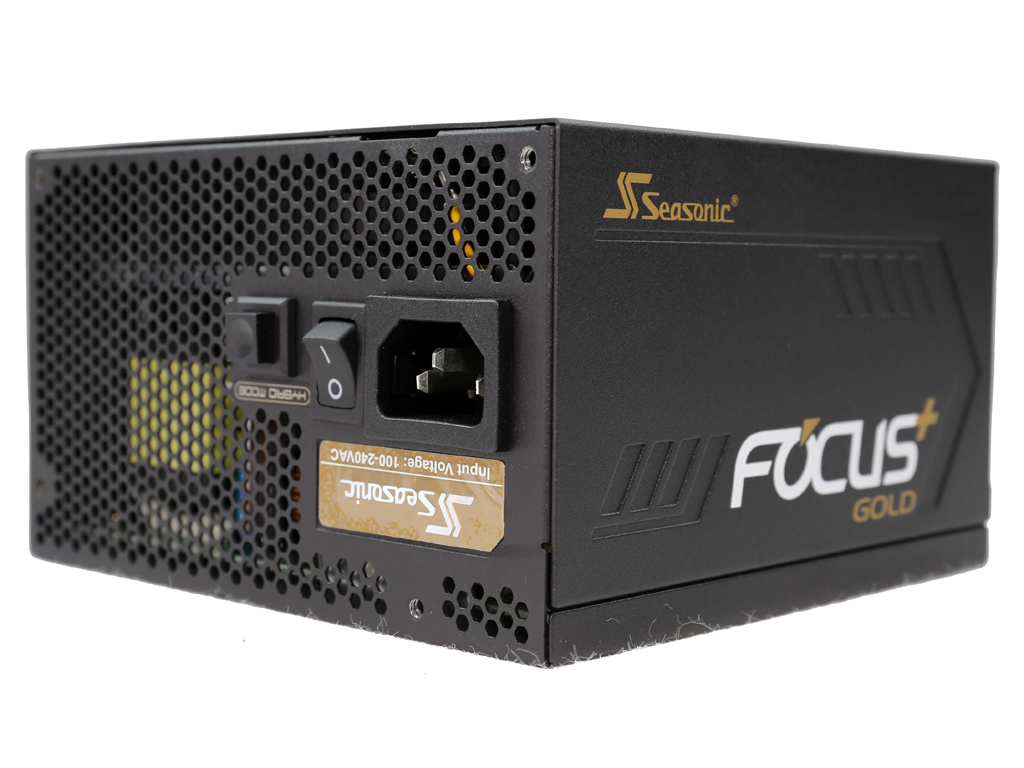Seasonic Focus Plus 750 Gold PSU Review
Why you can trust Tom's Hardware
Final Analysis
Seasonic's new Focus Gold line is interesting to us, since the company keeps its prices in check without negatively affecting performance or reliability. The SSR-750FX's feature list includes a selectable semi-passive mode, ultra-compact dimensions, fully modular cabling, and high-quality filtering caps. A 10-year warranty shows that Seasonic is exceedingly confident in its Focus PSUs.
The only downside we ran across during our performance testing was the 3.3V rail's response in our tough transient tests. This rail is only lightly used by modern systems. However, it would be nice to see Seasonic address this problem in future revisions of its design. We also weren't particularly fond of the fan's aggressive profile, which leads to increased noise output (particularly compared to the much quieter Corsair RM750x). On one hand, this PSU's compact dimensions are an advantage when it comes to installation and compatibility with small cases. On the other, Seasonic wasn't able to use a 135mm or 140mm fan to keep things quiet. Instead, the company went with a 120mm FDB fan that spins fast in order to deliver adequate airflow.
Perhaps the most important family for Seasonic, its Focus PSUs cover a number of price and capacity points, hitting a much broader market than the Prime models. The SSR-750FX currently sells for $100, which is impressive given its features. Although the competition is really tough in this segment, it achieves a compelling value score. Combined with a 10-year warranty, the SSR-750FX a solid choice for anyone shopping for a reliable PSU.
Seasonic was clever enough to equip its SSR-750FX with two EPS connectors, making it compatible with high-end motherboards that require extra power for the CPU (AMD's Threadripper processors, for example). Currently, high-end 750W PSUs like Corsair's RM750x, RM750i, and HX750 only have one EPS connector, so the SSR-750FX enjoys an advantage in this space.
If Seasonic can find a way around its loud operating noise under tough conditions, either by using a larger fan or a relaxed profile (or a combination of both), it'll earn even bigger points in its competitive category. Limiting noise output in such a compact enclosure won't be easy for the company's engineers, though, since reliability cannot suffer in the process. But until Corsair decides to add a couple of EPS connectors to its popular 750W models, the SSR-750FX and EVGA 750 G3 are among the top offerings in this category. And EVGA's solution costs $20 more...
MORE: Best Power Supplies
MORE: How We Test Power Supplies
Get Tom's Hardware's best news and in-depth reviews, straight to your inbox.
MORE: All Power Supply Content
Current page: Final Analysis
Prev Page Performance, Value, Noise & Efficiency
Aris Mpitziopoulos is a contributing editor at Tom's Hardware, covering PSUs.
-
none77 Thank you for the detailed review.Reply
In the transient response test
Advanced Transient Response at 50 Percent – 200ms
the +3.3 pass.
-
BugariaM As always, here are the most detailed reviews on the PSU.Reply
Thank you and keep it up!
The only thing that is not quite clear to me. What is the criterion for voltage drop in % to get PASS/FAIL in "Advanced Transient Response Tests"?
You declare that:
"In all tests, we measure the voltage drops." The voltages should remain within the ATX specification's regulation limits. "
For ATX 2.2 we have:
12v - 10%
5v - 5%
3.3v - 5%
5VSB - 5%
However, looking at your reviews, there are often situations where, at <5%, the power supply gets the FAIL mark and vice versa, some at >5% receive PASS
Why is this happening? -
Aris_Mp the limit is 5% however the voltage rails of the PSUs' under test in the majority of cases aren't at the nominal voltages, but higher, so even with 5% deviation voltages go don't bellow the limits that the ATX spec sets (11.4V, 4.75V, 3.14V). Only if a rail goes below those voltage levels it fails. The 5% is just an indication that the ATX provides to specify the voltages above.Reply -
fredlaso Dell Inspiron 5675 Desktop, PSU (power supply unit), upgrade. Would this PSU compatible with Dell Inspiron 5675 Desktop. It came with 460W I would like to replace it with PSU between 650 to 750W. I tried at Dell forums but cannot get a clean link which one would be compatible.Reply
I would greatly appreciate if someone could help me out. Thank you kindly in advance:
http://en.community.dell.com/support-forums/desktop/f/3514/t/20019321?pi21953=1#21018407
http://en.community.dell.com/support-forums/desktop/f/3514/p/20024419/21031446#21031446
System Comp,:
Compatible Power Supply needed for Inspiron 5675 Gaming Power Supply
Specs:
AMD Ryzen 7 1700X 3.4GHz Octa-Core Processor
8GB 2400MHz DDR4 RAM
1TB 7200 RPM Hard Drive
AMD Radeon RX 580 8GB GDDR5 Graphics Card
DVD+RW Drive
Dual Band WiFi 802.11ac + Bluetooth 4.1
Windows 10 Home (64-bit)
460 Watt Power Supply w/ Polar Blue LED
Includes: Dell KB216 Wired Keyboard + Dell MS116 Wired Mouse
Ports:
6x USB 3.0
1x USB 3.1 Type-C Gen 1
2x USB 2.0
1x Audio Combo Jack
1x 3-in-1 Media Card Reader
1x P/S 2
1x 7.1 Channel Audio Out
Expansion Slots:
3x 3.5" bay
2x 2.5" bay
2x PCIe x1
2x PCIe x16
http://en.community.dell.com/support-forums/desktop/f/3514/t/20019321?pi21953=1#21018407
http://en.community.dell.com/support-forums/desktop/f/3514/p/20024419/21031446#21031446 -
paulinosaka My Seasonic Platinum began failing under load after only 10 months. Paid cash here in Japan at Joshin - couldnt find reciept - honestly never thought I would need it ever. Seasonic would not help me.?Reply
REPLY
